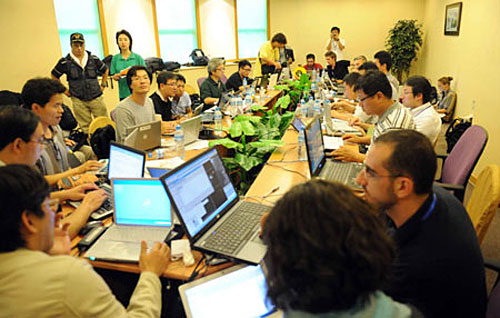|
 |
|
Chinese and foreign journalists work at the press center established at Hoi Tak Hotel in Urumqi, capital of northwest China's Xinjiang Uygur Autonomous Region, on July 7 (XINHUA) |
More than 60 overseas media have sent journalists to Urumqi, capital of northwest China's Xinjiang region, after a riot broke out in the city Sunday, leaving 156 people dead and 1,080 others injured.
"We disclosed information shortly after the incident. We welcome domestic and overseas journalists to come and see what happened," Hou Hanmin, deputy head of the publicity department of the Communist Party of China (CPC) Xinjiang regional committee, said Tuesday.
"As long as security can be guaranteed, we will try our best to arrange interviews," the official said, adding the country was moving ahead on information disclosure.
Sixty overseas news media and 80 domestic news media organizations attended a press conference Tuesday afternoon, at which the Urumqi mayor said identification of the dead in the riot is underway.
"The government adopts a much more open attitude toward the media after the incident, compared with that after the March 14 unrest in Tibet and the Sichuan earthquake last year," said Ted Plasker in fluent Chinese. He is a journalist with The Economist who has been in China since 1989.
"I saw tight security and very little traffic in the city," said Plasker, who arrived in Urumqi Monday afternoon.
"I have been to the scene and the hospitals. It's horrible to see the people drenched in blood and the shattered shops. Many people who had been attacked told me they did not understand why it happened."
Plasker said he himself wanted to know why such a violent riot had happened.
"Some places in the city were surrounded by policemen and traffic control could be seen," he said. "But I understand it's for our safety."
Choi Yoo Sik, a journalist from South Korean daily Choson Ilbo, said the Chinese government was very open on the incident. "We foreign journalists can interview anybody, Han or Uygur. I have got enough information for my stories."
However, when speaking about the situation in the street, he frowned and said, "it is still dangerous at the moment."
Urumqi authorities have opened a news center, equipped with more than 50 computers with Internet access, to both Chinese and foreign journalists since Monday afternoon.
(Xinhua News Agency July 7, 2009) | 